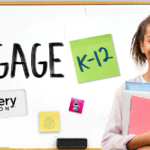Kristin Barbour is the Executive Director for the National Institute for Learning Development (NILD), a U.S. based non-profit educator training organization. Since 1973, NILD has built the competence and confidence of those who struggle to learn by training educators and implementing research-based, best practice interventions to bring lasting change for struggling learners (www.nild.org). Kristin completed her EdD at Johns Hopkins University in the Mind, Brain, and Teaching specialization. Her dissertation focused on developing educational therapists’ knowledge, efficacy beliefs, and instructional practices related to developing a growth mindset in students with learning disabilities. Prior to working at NILD, Kristin worked as an inpatient speech-language pathologist at Children’s Hospital of the Kings Daughters in Virginia. For over a decade, Kristin has provided national and international educational workshops on topics related to learning disabilities, dyslexia, and developing students’ thinking and learning abilities.
NILD’s mission is to train educators to be a transformational influence on students’ thinking and learning processes to develop their cognitive and academic abilities. Over the past 40 years, NILD has trained over 15,000 educators world-wide and has globally impacted over 100,000 students through our brain-based teaching programs. Currently, NILD is serving 2,000 educators throughout the U.S. and internationally. NILD also supports seven international partner countries implementing the NILD program in schools and communities.
Historically, society believed that intelligence was a fixed trait (e.g., think eye color) that remained stable over the life span. NILD believes that intelligence resembles a state that can be modified and that students can increase their capacity to learn. Recent NILD program efficacy studies have shown that 62% of students who utilized NILD’s educational therapy® over a three year period showed statistically significant gains in their full-scale IQ. Growth in the academic domains of Reading, Writing, Spelling, and Math was also demonstrated across elementary, middle, and high-school students. NILD not only believes that everyone can learn, but also that focused effort with a student can unlock a lifetime of potential.
NILD trains and equips educators to address students’ learning abilities through a comprehensive approach, as illustrated in the NILD logo. Each of the four elements contained in the NILD logo uniquely and comprehensively addresses the personalized needs of all learners. NILD’s holistic approach to learning builds thinking and changes behavior. Our student-centered, brain-based instructional approach raises expectations for cognitive and emotional change, building competent and confident learners who want to learn. NILD educational methodology uniquely uses language to shape thinking and develop core academic skills and critical thinking through:
 Explicit and intentional instruction
Explicit and intentional instruction- Inductive reasoning and Socratic Questioning
- Guided practice and Systematic feedback
- Student self-regulation and transfer of skills
As a result, confidence and competence are improved for all students. Educators are better equipped to be agents of renewal. Students become active participants in their own learning. Individual potential is unlocked, and students’ horizons are expanded. By equipping teachers to teach students how to learn, students emerge as independent learners, more capable future employees, family members, and responsible citizens.
At present, only a handful of other (fewer than 10) U.S. companies have been endorsed by the International Dyslexia Association (IDA www.interdys.org). The significance of the IDA endorsement is that a highly credible, international organization, recognizes NILD as meeting the knowledge and practice standards of training programs that equip educators to work with individuals with dyslexia and language-based learning difficulties. NILD’s competitive edge is that it develops competency with core academic skills, including reading, math, and writing through a comprehensive approach aimed at facilitating cognitive development. Fundamentally changing the learner is the goal, not just helping them develop a subset of skills.
One of the most pressing issues today for educators is how to work with all learners effectively. Many veteran educators, as well as newly trained educators, have not been exposed to the scientific support for neuroplasticity, the belief that intelligence is not fixed. Not fully grasping this concept seems to impede students from reaching their full potential. NILD acknowledges the recent advances in research that show there is a direct relationship between using the brain and changing the brain. Neuroplasticity is meaningfully affected by the learning process. Stated another way, cognitive development and skill acquisition change brain structure. The neurophysiological structures in the brain are modifiable, demonstrating both flexibility and adaptability. Educators using brain-based instruction strategies infused with a student-centered mediational approach develop critical and creative thinking processes facilitating students’ growth into independent and confident learners.
NILD’s long history of working with students from a variety of educational environments, coupled with new data from psychology and neuroscience, has provided ample evidence that how students learn is as important, or perhaps even more important, than what they learn. Unfortunately, most people in education remain somewhat unaware of this basic principle. NILD believes that while subject matter is always an important consideration, the appropriate solution, in this case, is to equip students with cognitive skills that can be applied to any subject – and ultimately to workplace and life decisions beyond the classroom. NILD offers a wide range of classroom educator training opportunities to equip educators to offer small-group, targeted instruction in the areas of early childhood development, reading, math, and writing. We also offer Feuerstein Instrumental Enrichment (FIE) Training that equips educators to offer cognitive enrichment for all learners as well as offer an extra challenge for students in need of additional stimulation. These small group support services offer students targeted, research-based intervention and enrichment strategies to increase learning, change thinking processes, and help students unlock potential for greater success in the classroom setting ~ and life! Classroom teachers can take part in 2-day or 5-day training courses to be equipped to provide these evidence-informed instructional strategies and enrichment during the regular school day.
The American Consortium for Equity in Education, publisher of the "Equity & Access" journal, celebrates and connects the educators, associations, community partners and industry leaders who are working to solve problems and create a more equitable environment for historically underserved pre K-12 students throughout the United States.
- American Consortium for Equity in Educationhttps://ace-ed.org/author/admin/
- American Consortium for Equity in Educationhttps://ace-ed.org/author/admin/April 23, 2025
- American Consortium for Equity in Educationhttps://ace-ed.org/author/admin/
- American Consortium for Equity in Educationhttps://ace-ed.org/author/admin/







